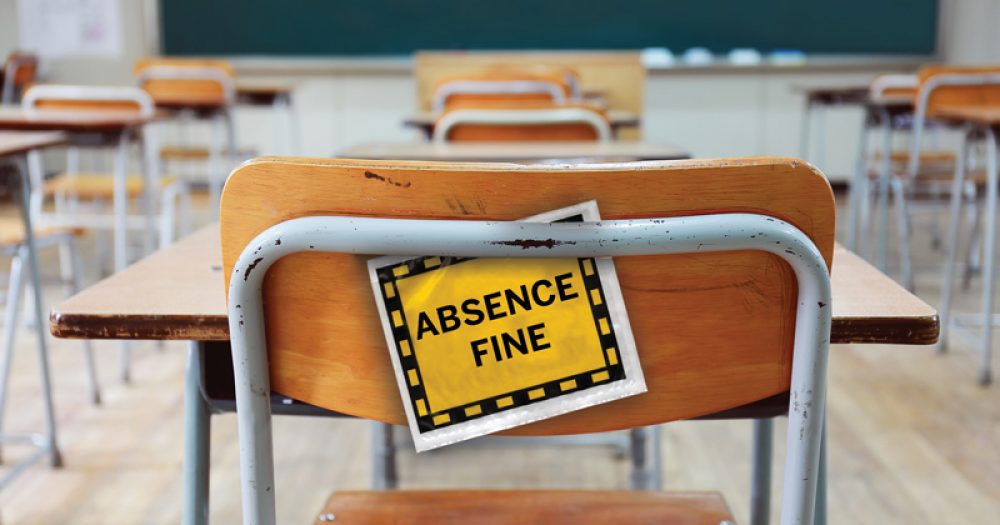The government will raise fines handed to parents for unauthorised school absence by a third and force all schools to submit daily attendance data from September.
Parents are currently fined £60, rising to £120 if not paid within 21 days, for unauthorised absences. Ministers said today they would increase for the first time since 2012 to £80 (rising to £160), bringing them in line with inflation over the past 12 years.
Guidance on how to tackle absences will become statutory from the beginning of next academic year, as will participation in the government’s daily attendance tracker, which scrapes data from schools’ electronic registers.
The guidance will include a national “framework” governing absence fines, amid concerns about inconsistency from area to area. Legislation to enact the changes will be introduced in Parliament tomorrow.
It means schools will be required to consider fines when children miss more than five days – or 10 half-day “sessions” – at school in 10-week period, a proposal already set out in a government consultation in 2022.
Writing for Schools Week, schools minister Damian Hinds said warned of a “postcode lottery, which sees parents in some areas getting fined for [unauthorised absence], while others aren’t”.
He added that persistent absence “denies [children] the future they could and should have. These new measures will put in place the means to make sure they get it”.
Trust leader appointed attendance tsar
Ministers have also named an academy trust chief executive as their first attendance tsar. Rob Tarn, of the Northern Education Trust, set up the first “attendance hub” at the North Shore Academy. There are now 32 hubs nationwide.
Tarn will be tasked with working with schools and school leaders to “champion attendance, share effective practice, and support the ongoing development of the attendance hubs programme nationally”.
Today’s announcements mark the latest development in a government clampdown on absences, which remain stubbornly high after Covid lockdowns. Education secretary Gillian Keegan said attendance was her “number one priority”.
Last academic year, 22.3 per cent of pupils missed more than a day a fortnight, up from between 10 and 13 per cent pre-pandemic.
Ministers had already pledged to put attendance guidance on a statutory footing and make its daily register mandatory, but confirmed today both would happen from September 2024.
The attendance data will form what the DfE called a “new world-leading attendance data set that will help schools spot and support children displaying worrying trends of persistent absence or those in danger of becoming missing in education”.
Most schools have already signed up to share their data as part of a pilot, which has faced criticism from the Information Commissioner’s Office. Schools Week revealed in 2022 how the watchdog had raised numerous concerns about the “high-risk” pilot.
The ICO found ministers failed to properly assess the data protection risks of the tracker before its launch and misled schools about the involvement of the information watchdog.
‘Data dashboard’ for schools
Schools, trusts and councils will be able to access the data “via an interactive secure data dashboard” maintained by the DfE.
This will “allow them easy use of the data to not only spot pupils in need of support but also to understand how their attendance position compares locally and nationally so they can look at where they might need to drive improvements”.
But pupil and school level data “will only be available for the relevant responsible body, school and the department for education”.
Absence fines, which were handed out in record numbers last year, will increase from a basic rate of £60 to £80, and guidance will be more prescriptive on when penalties must be considered.

But guidance will “clarify that fines should only be used where attendance support has been provided and not worked or been engaged with, or where support is not appropriate (eg, a term time holiday)”.
There will also be “no early payment discount for a repeat offender”, Hinds said.
Geoff Barton, general secretary of the ASCL leaders’ union, said it was “not unreasonable to increase the level of fines for unauthorised absence given that they have been fixed at £60 for several years”.
But it was “important to understand that these fines predominately relate to pupils who are taken out of school for term-time holidays”.
However, he said there was a “wider issue about absence relating to the growing number of children who suffer from anxiety and other mental health issues, families who are struggling to cope, and disengagement with education, which schools are endeavouring to address”.
“Schools need more help from the government in this work both in terms of the funding they receive and investment in local social care, attendance and mental health services.”















The holiday companies need to be looked at, the school holidays prices are too high, if holidays was a reasonable priced parents wouldn’t take their children out of school. Parents argue with me over the fine but need to realise I am not on a high wage either and the prices are the same for me and my family.
I agree with you but they won’t because it’s all about profit. Taking kids on holidays creates memories that lasts a lifetime but school is quickly forgotten . The introduction of Trusts has destroyed education and the curriculum is not relevant to todays children and it’s all about metrics for schools and not the the individual child. Exams are a moment in time, memories from
Holidays last a lifetime.
I have pondered over the holiday costs since 2014 , if going abroad by plane it virtually quadruples compared to a week B4 and after returning to school for many European destinations. Hotels prices are okay , with a slight rise , Feb break and Easter . Half term may/June and mid to august end are naturally high season hotel costs for all of Europe. Here’s a ditty for you , the half term may/ June is only in UK .
Flights from other European countries that want to get to popular hot holiday resorts during same 2 weeks are a lot cheaper. UK flights are a business 1st so this is where they seek highest charges . Some airlines flying from UK do offer a fairly keen outward ticket but absolutely sting you for a return, B4 schools reopen. My personal thought was to minimise summer break to 4 weeks and add a week to half-term may/June and the October term break . Also a geographical 3 way split in times of school hols through England, as gov schools in Scotland already takes a break a week or fortnight earlier. Just sayin .
I think fines are such a waste of time and don’t solve the problem . If anything it makes things worse as more parents particularly those whose children have Send are forced to take their children off roll and home educate.
I do think the tracker is a good idea as academies and Trusts have little accountability to parents. In a secondary school in our local MAT persitance absence has been recorded as 51.6%. The headteacher left last year but she reported directly to the CEO of the MAT. This headteachers husband also reports to the CEO and is the director of improvement for secondary school.
The conflict of interest and loyalty has now led to a Requires Improvement for education and leadership in a recently published Ofsted report. But they no doubt won’t be fined for failing our children.
MISALIGNED VALUES IMPACTS SOCIETY
Society at large, and notably political leaders, often fails to accord teachers and the teaching profession the respect they deserve. Yet, there is a societal expectation for students to demonstrate respect towards their teachers and place value on their education. This misalignment is inherently counterintuitive. The discrepancy between the treatment of teachers by society and the expectations placed on students creates a fundamental paradox at the heart of education. This disparity not only impacts the educational sphere but also permeates broader societal issues. Justifying this assertion requires recognition of the pivotal role teachers’ play in shaping future generations and fostering societal progress. When teachers are undervalued and their profession lacks respect, it undermines the entire educational system, hindering the development of students and impeding societal advancement. Therefore, addressing this fundamental contradiction is crucial for both improving education and cultivating a more respectful and equitable society. If schools are a microcosm of society and there is a glaring lack of respect in schools, this is bound to extend beyond the walls of the schools. In the lexicon of ecology or ecosystems, teachers are KEYSTONE components vital to the health and prosperity of society.
Student absenteeism, among numerous other challenges prevalent in schools, can be partially attributed to the diminished value placed on education by both parents and students alike. When the teaching profession is not esteemed and educators are not accorded the respect they deserve, it sends a signal to students that their education is of little value. Consequently, students may fail to recognize the importance of attending school regularly, engaging in their studies, and respecting their teachers.
PATRICK O. OBIKWU
(Education Leadership, Learning Strategist, School and Youth Development, Critical Theorist, Entrepreneur)
MA (Ed); P.G. Cert (Dev. Ed. & Global Learning); UK QTS (Science); Adv. Cert. (Sports Sc.); BSc (Hons) Biochemistry